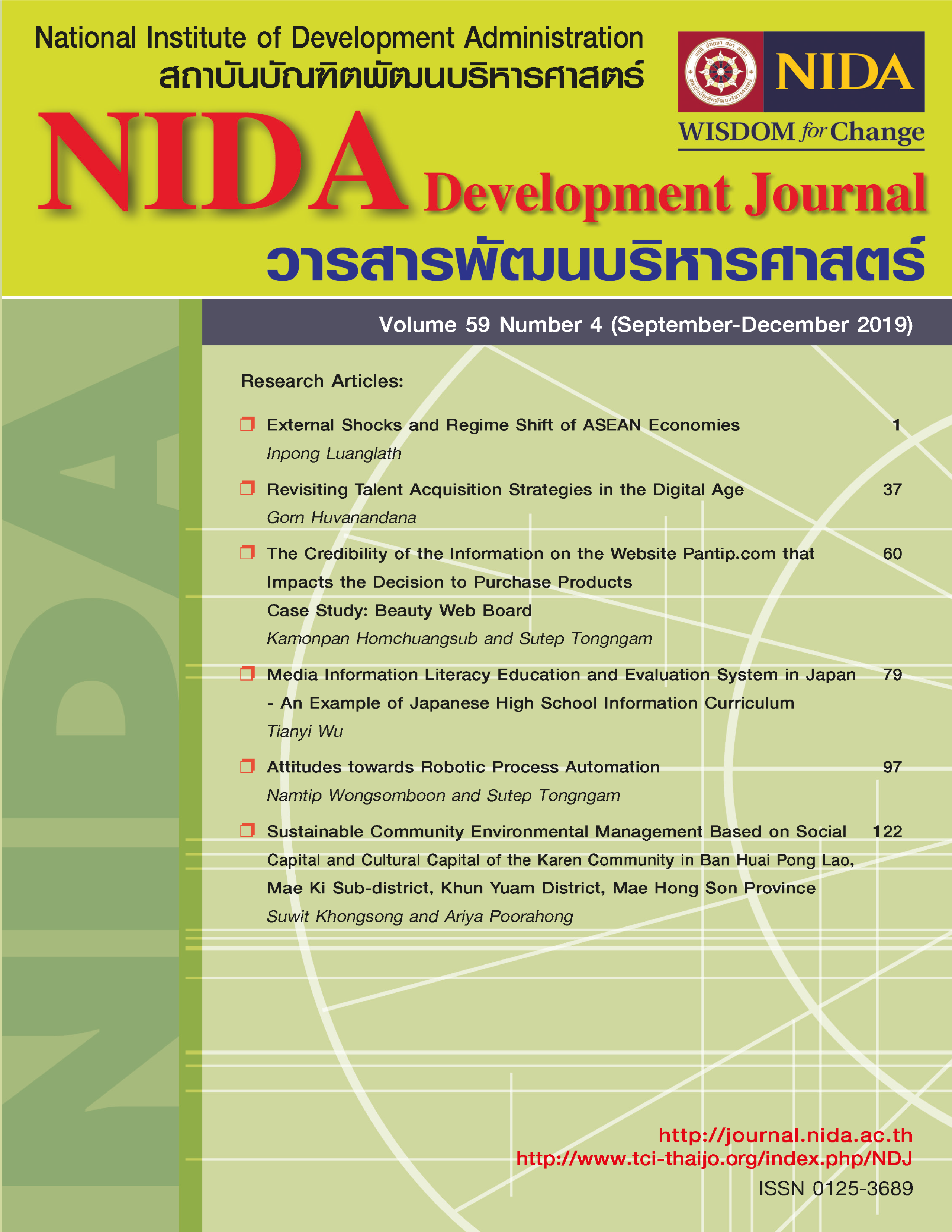Sustainable community environmental management based on social capital and cultural capital of the Karen community in Ban Huai Pong Lao, Mae Ki sub-district, Khun Yuam district, Mae Hong Son province
Keywords:
Sustainable community , Karen community , Environmental managementAbstract
The research aimed to 1) Study the context of social capital and cultural capital of the community 2) Study the community environmental management under the context of social capital and cultural capital of the community. It was Qualitative Research, consisting of data analysis and field survey through in-depth interview, focus group, and participant and non-participant observation. The key informants included 31 network committee members, leaders, civil society, the elderly, government officials, community outsiders, and local residents. The tools included semi-structured and unstructured interviews and data analysis according to the Qualitative Research. The research findings revealed the following: 1. In terms of social capital and cultural capital of the community in Ban Huai Pong Lao, it was a very abundant community, with peaceful and simple ways of life, and high level of love and unity among community residents. Moreover, community leaders had potential, community members held religious belief with regular religious practices, network with other communities, eco-system management based on local wisdom and belief, use of local wisdom for hand-woven cotton clothes since the ancient times, bond with nature, and rituals were accompanied by traditional beliefs 2. Sustainable community environmental management based on social capital and cultural capital of the community in Ban Huai Pong Lao principally practiced subsistence economy by relying on beliefs, culture, and traditions that were linked and connected with nature and the environment with respect, for example, water source management based on local wisdom, rice cultivation and cattle raising as supplementary occupation to generate income, and outstanding “peaceful and happy” village based on the Sufficiency Economy at the provincial level.
References
Ammar Siamwalla. (2001). Picking up the pieces: Bank and corporate restructuring in post-1997 Thailand. In ESCAP (Ed.), Governance Re-Invented: The Progress, Constraints, and Remaining Agenda in Bank and Corporate Restructuring in East and South-East Asia. United Nations, Economic and Social Commission for Asia and the Pacific. Bangkok.
Anek Nakabutr. (2002). Social capital and civil society in Thailand. Bangkok: Social Fund Office and Government Savings Bank.
Beebe, J. (1987). Rapid appraisal: The evolution of the concept and the definition of issues. In Khon Kaen University (Ed.), Proceedings of the 1985 international conference on rapid rural appraisal. Siriphan Press. Khon Kaen, Thailand.
Hirschman, E. C. (1984). Experience seeking: A subjectivist perspective of consumption. Journal of Business Research.
Knack, S., & Keefer, P. (1997). Does social capital have an economic payoff? A cross-country investigation. The Quarterly Journal of Economics, November.
Mitree Intria. (2017). Social Capital Learning Institute for Everyone (LIFE). Social Capital, 9(2), July- December.
Narayan, D., & Pritchett, L. (1997). Cents and sociability: Household income and social capital in rural Tanzania. Policy Research Working Paper 1796. Washington, DC: The World Bank.
Office of the National Economic and Social Development Board. (2002). Ninth National Economic and Social Development Plan, 2002-2006. Bangkok: Office of the Prime Minister.
Pornchai Preechapanya, & Warin Jirasuktaweekul. (2001). Karen knowledge about the sustainability of forested watershed and agroforestry ecosystems. Journal of The Forestry Research, 3(1).
Preecha Piempongsarn, Kanchana Kaewthep, & Kanoksak Kaewthep. (2006). A new way of development methodology for studying Thai society. Chulalongkorn University Press. Bangkok, Thailand.
Putnam, R. D., Leonardi, R., & Nanetti, R. Y. (1993). Making Democracy Work: Civic Traditions in Modern Italy. Princeton, New Jersey: Princeton University Press.
Sansern Wongcha-um. (2011). National development planning. Bangkok: Phet Rung Printing Center.
Sinad Treevanchai. (2003). Social Capital and the Performances of Savings Groups: A Case Study in Songkhla. Master's Thesis, Faculty of Economics (English Program), Thammasat University.
Suwit Khongsong, Suwicha Kosaiyawat, & Chanchalee Mapudh. (2019). Community Empowerment of Taling Chan Floating Market Community, Bangkok Metropolitan Based on Social Capital and Cultural Capital. Journal of Education and Social Development, 14(2).
Thompson, M. (2018). Social capital, innovation and economic growth. Journal of Behavioral and Experimental Economics.
Worawut Romratapun. (2005). Social capital, a project to enhance learning for a happy community. Chulalongkorn University Press. Bangkok, Thailand.
World Bank. (1999). Social Capital, Household Welfare and Poverty in Indonesia. Working Paper No. 6. Washington, DC.
Downloads
Published
How to Cite
Issue
Section
License
Copyright (c) 2024 NIDA Development Journal

This work is licensed under a Creative Commons Attribution-NonCommercial-NoDerivatives 4.0 International License.





